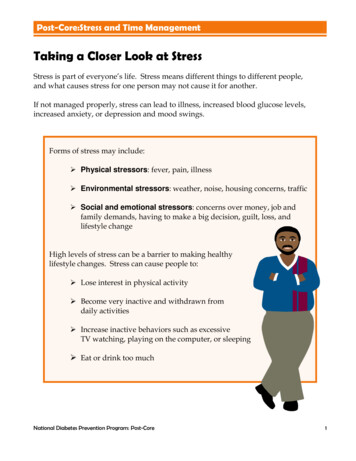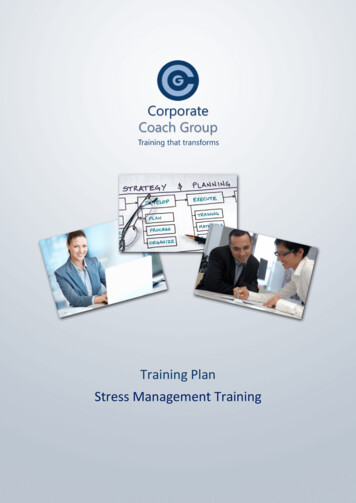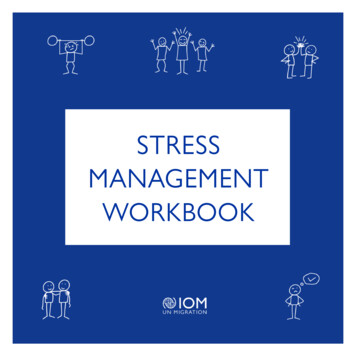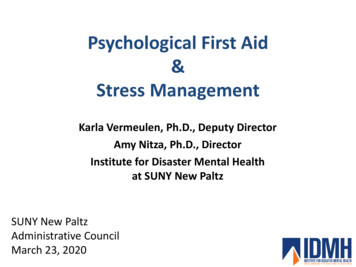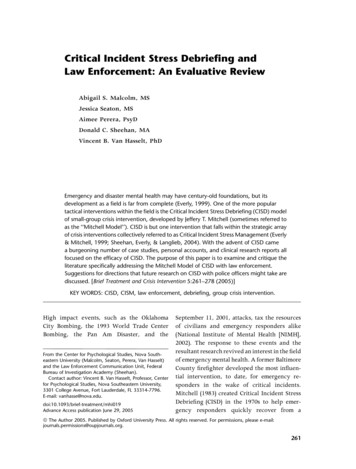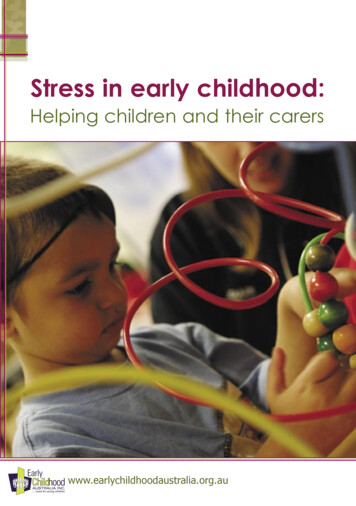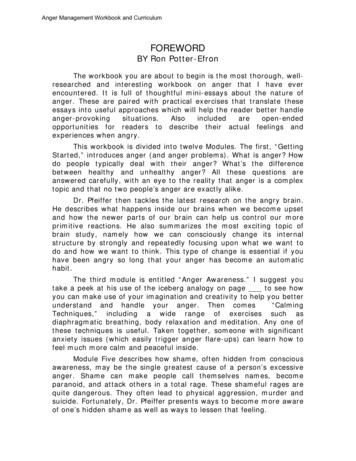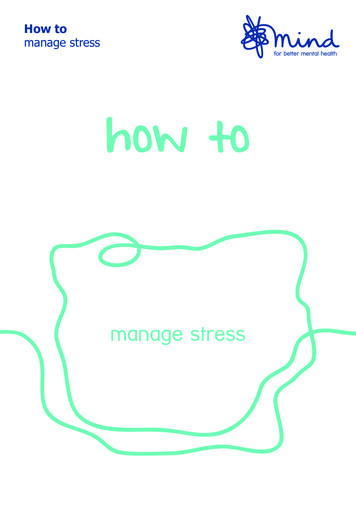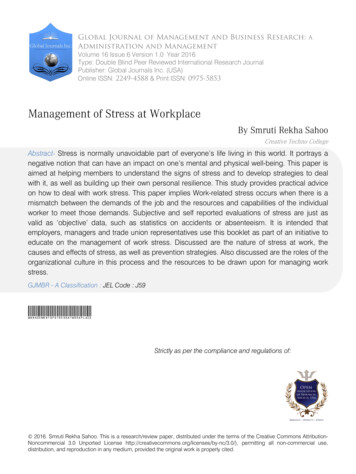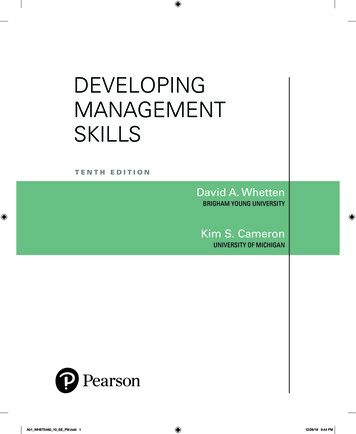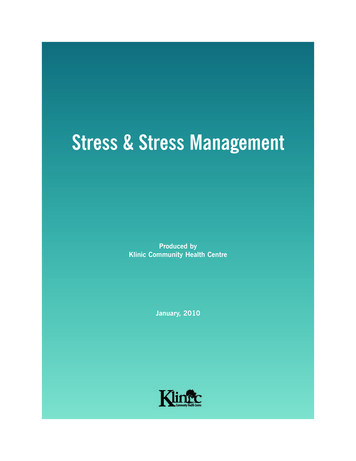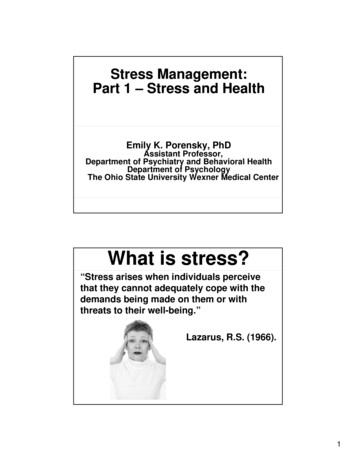
Transcription
Stress Management:Part 1 – Stress and HealthEmily K. Porensky, PhDAssistant Professor,Department of Psychiatry and Behavioral HealthDepartment of PsychologyThe Ohio State University Wexner Medical CenterWhat is stress?“Stress arises when individuals perceivethat they cannot adequately cope with thedemands being made on them or withthreats to their well-being.”Lazarus, R.S. (1966).1
The Stress LossWhatdoes thismean?Stressfulevent orsituationPrimaryAppraisalWhat canI do?SecondaryAppraisalSTRESS &COPINGIs all stress bad?The Yerkes-Dodson LawAuthor: Vaughan2
Common Life Stressors DeathDivorceLoss of a jobStarting a new jobFinancesGetting marriedMovingChronic illness or injuryInterpersonal conflictTaking care of an elderly or sick family memberWork-Related Stressors Being unhappy in your job Having a heavy workload or too muchresponsibility Working long hours Unclear expectations or no say in decisionmaking Working in dangerous conditions Insecurity about advancement or risk oftermination Having to give speeches in front of colleagues Facing discrimination or harassment3
Impact of Stress 60-80% of outpatient visits may be related tostress (Rosch, 1991; Avey, Matheny,Robbins, & Jacobson, 2003)) Linked to all leading physical causes ofdeath - heart disease, cancer, stroke(Cohen, Janicki-Deverts, & Miller, 2007) Associated with development of most majormental health problems – depression, PTSD,pathologic aging (Marin et al., 2011)Impact of Stress Affects fetal development & outcomes (Kinsella &Monk, 2009)CDC/ Jim Gathany Predicts negative health behaviors and relapses –smoking, alcohol abuse, illicit substance use,sleeplessness (Kassel, Paronis, Stroud, 2003;Herman,, 2012;; Ellis,, et al.,, 2012))CDC/ Debora Cartagena4
Primary Care:Stress Management Counseling National study suggests that only 3% officevisits included stress management counselingb primaryih i ibycare physicians(Nerurkar, 2012; JAMA – Internal Medicine) 42% report receiving no instruction regardingstress and health outcomes in medicaleducation 76% lacked confidence in their ability tocounsel patients about stress 49% indicated a lack of referral sources(Avey, Matheny, Robbins, & Jacobson, 2003)Do as I say Not as I do 57% of outpatient medical clinic providers(physicians, residents, NP’s, and PA’s)“l ” or “never”“” practicingti i stresstreportt “rarely”reduction techniques themselves Those who do practice use the following:- exercise (70%)- meditation (32%)- imagery (26%)- deep breathing (21%)- mindfulness(16%) - PMR (16%)(Avey, Matheny, Robbins, & Jacobson, 2003)5
Stress Management:Part 1 – Stress and HealthSharla Wells-Di Gregorio, PhDAssistant Professor of Psychiatry and Behavorial Health,Psychology & Internal MedicineClinicalPsychosocialCli i l Psychologist,Ph l i t Phi l OncologyOlDirector, Psychosocial Oncology Fellowship ProgramThe Ohio State University Wexner Medical CenterHow does stress getunder the skin? Fight or Flight responses: SAM activation HPA activation Allostatic load6
FightorFlightHypothalamicPituitary AdrenalAxis(Glaser & Kiecolt-Glaser, 2005)7
Allostatic Load(Juster, McEwen & Lupien, 2010)Diseases and Illnesses Caused by StressSeaward, B. (1999). Managing Stress : Principles and Strategies for Health and Wellbeing.Boston, Mass: Jones and Bartlett.Original image in the public domain - Author: Bouglé, Julien8
Benefits of Stress Reduction Better concentration/focusMore stable moodsImproved communication/relationshipsBetter physical healthIncreased sense of control of time and activityCDC/Amanda MillsReferences Avey, H., Matheny, K. B., Robbins, A., & Jacobson, T. A. (2003). Health care providers'training, perceptions, and practices regarding stress and health outcomes. Journal of theNational Medical Association, 95(9), 833.Cohen, S., Janicki-Deverts, D., & Miller, G.E. (2007). Psychological stress and disease.JAMA, 298, 1685-1687.Ellis, J.G., Gehrman, P., Espie, C.A., Riemann, D., & Perlis, M.L. (2012). Acute insomnia:Current conceptualizations and future directions. Sleep Medicine Reviews, 16, 5-14.Glaser, R. & Kiecolt-Glaser (2005). Stress-induced immune dysfunction: Implications forhealth. Nature Reviews: Immunology, 5, 243-251.Herman, J.P. (2012). Neural pathways of stress integration: Relevance to alcohol abuse.Alcohol Research: Current Reviews, 441-447.Kassel, J.D., Paronis, C.A. & Stroud, L.R. (2003). Smoking, stress and negative affect:Correlation, causation, and context across stages of smoking. Psychological Bulletin,129, 270-304.Kinsella, M.T. & Monk, C. (2009). Impact of maternal stress, depression, and anxiety onfetal neurobehavioral development. Clinical Obstetrics & Gynecology, 52, 425-440.Lazarus, R.S. (1966). Psychological stress and the coping process. New York: McGrawHill.HillMarin, M-F., Lord, C., Andrews, J., Juster, R-P., Sindi, S., Arsenault-Lapierre, G., Fiocco,A.J., & Lupien, S.J. (2011). Chronic stress, cognitive functioning, and mental health.Neurobiology of Learning and Memory, 96, 583-595.Nerurkar, A., Bitton, A., Davis, R. B., Phillips, R. S., & Yeh, G. (2013). When PhysiciansCounsel About Stress: Results of a National Study. JAMA internal medicine, 173(1), 7677.Rosch, P. J. (1991). Job stress: America’s leading adult health problem. USA Magazine, 2.Yerkes, R.M. & Dodson, J.D. (1908). The relation of strength of stimulus to rapidity ofhabit-formation. Journal of Comparative Neurology & Psychology, 18, 459-482.9
Stress Management:Part 2 – InterventionsSharla Wells-Di Gregorio, PhDAssistant Professor of Psychiatry and Behavorial Health,Psychology & Internal MedicineClinicalPsychosocialCli i l Psychologist,Ph l i t Phi l OncologyOlDirector, Psychosocial Oncology Fellowship ProgramThe Ohio State University Wexner Medical CenterStrategies that DO NOT work “Try to be more positive.” “Everything will be okay.” “JustJust stop worryingworrying.”(i.e., Don’t worry, be happy.) Thought stopping (Wegner, 1994) Avoidance & numbing– Alcohol or drug use– DistractionDi tti & procrastinationti ti AnxiolyticsCDC/Debora Cartagena 77% of the chronically anxious canimprove with cognitive (thought) andbehavioral (action) strategies10
Cognitive BehavioralTherapy (CBT) Structured, brief and time-limited therapy Focused on current behavior Empirically-supported to treat a range ofclinical problems, including:– Anxiety disorders and insomniap– Depression– Eating disorders– Chronic painButler, Chapman, Forman & Beck, 2006Problem vs. Emotion-Focused CopingIs there a problem?YesCan I change it?YesNoIs now a good time towork on 11
Problemfocused Coping Emotionfocused CopingProblem-solvingGetting organizedTime-managementAssertivecommunication tomanageinterpersonalstressors Obtaininginstrumental socialsupport Distraction withpleasurable activities Talking with a friend Diaphragmaticbreathing Relaxation Mindfulness Obtaining emotionalsupportProblem-SolvingStep 1 Define the problem.Stepp2Step 3 Brainstorm solutions.Step 4 Select best alternative.Step 5 Implement strategy.St 6Step Monitor progress.Step 7 Go to Step 1 if needed. Weigh au/resources/docs/Info-Problem%20Solving.pdf12
Time Management 168 hours in a week: Keep a timediary(Vanderkam, 2010)– How do you spend your time?– What things do you do that youare good at?– What things do others do betterthan you?– When do you tend to waste time?– What brings you meaning in life?– Is your time focused on what youvalue most (and are best at)? Learn to say “no” and delegateOther Tips for Managing Time– Clarify and set “SMART” goals.SMART Specific Measurable Achievable Relevant TimeTime--based– Monitor progress– Celebrate successes and examinefailures13
Managing Email& Smartphone Stress Check email onlyy at scheduled times– Start your day with the most stressful task– Save email checking for later in the day– Turn off audible alerts Have separate work and personal accounts– Remove yourself from listservs Block time to not answer your phone– Especially before bed!Seek Social Support Who?– Family, friends, neighbors,clergy professionalsclergy, How close?Author: Rhoda BaerYou14
Monitor Expectations Helps get thingsdone (e.g., mowthe lawn, babysitting,chores) Listens to yourproblems &cares aboutyour feelingsEmotionalSupportInformationSupport Gives adviceor informationPracticalSupportCompanionshipSupport Does thingstogether withyou for funStress Management:Part 2 – InterventionsEmily K. Porensky, PhDAssistant Professor,Department of Psychiatry and Behavioral HealthDepartment of PsychologyThe Ohio State University Wexner Medical Center15
Diaphragmatic BreathingCC0 1.0 Universal Public Domain DedicationAuthor: John PierceTeach Diaphragmatic Breathing Get into a comfortable position; eyesclosed Place one hand on your chest, one hand onyour abdomen Breathe in 1-2-3-4-5; breathing out 1-2-3-4-5 Practice for 5 to 10 minutes16
Progressive MuscleRelaxation Systematic tensing & relaxing of musclegroups (usually 14 or less) Produces relaxation response via: awareness of muscle tension Monitoring & muscle tension Taught by trained clinician Practiced at home in 10-15 minutes dailyBenefits of PMR Decreased painImproved sleepIncreased energy/decreased fatigueDecreased perceived stress & anxietyImproved relaxationDecreased physiologic indices of stress Lower heart rate & salivary cortisolMcCallie & Blum, 2006; Parlow & Jones, 200217
Mindfulness Being fully aware in the present moment,non-judgmentally– Opposite of auto-pilot or multi-tasking– Allows us to be aware of actions andemotions– Increases our ability to prioritize, focus,and make life choices that areconsistent with our values Associated with decreased stress andimproved mental & physical healthBrown & Ryan, 2003; Grossman, Niemann, Schidt & Walach, 2004;Hoffman, Sawyer, Witt, & Oh, 2010; Klatt, Buckworth & Malarkey, 2008Practicing Mindfulness Mindfulness Meditation– Mindfulness of breath Body Scan Yoga Mindfulness-Based Stress Reduction(Kabat-Zinn, 2003) “Wherever you Go, There you Are:Mindfulness Meditation in Everyday Life” byJon Kabat-Zinn Mind the Moment (free online course)www.harvardpilgrim.org/mindfulness18
Not Enough Time?Ask: “What is most stressful in your life right now?”ANDEducate the patient about the importance/benefits of stressmanagementTHEN1. Hire a psychologist to work as part of your multidisciplinary team2. Refer patients to a counselor for Cognitive Behavioral Therapy via: Employee Assistance Programs Ohio Psychological Association: www.ohpsych.org/referral/ The internet: www.therapists.psychologytoday.com Community Mental Health Centers: mha.ohio.gov/3. Recommend classes in relaxation, mindfulness, or meditation: At Ohio State e services/integrative es.aspx At local YMCAs and health centers4. Recommend an online stress management workshop: http://hillsborough.ifas.ufl.edu/family life/stress management.shtmlDo as I say .AND as I do 19
References Brown, K.W. & Ryan, R.M. (2003). The benefits of being present:Mindfulness and its role in psychological well-being. Journal ofPersonality and Social Psychology, 84, 822-848Grossman, P., Niemann, L., Schmidt, S., & Walach, H. (2004).Mindfulness-based stress reduction and health benefits: A metaanalysis. Journal of Psychosomatic Research, 57, 35-43.Hoffman, S. G., Sawyer, A. T., Witt, A. A., & Oh, D. (2010). The effect ofmindfulness-based therapy on anxiety and depression: A meta-analyticreview. Journal of Consulting and Clinical Psychology, 78, 169–183.Kabat-Zinn, J. (2003). Mindfulness-based interventions in context: Past,present, and future. Clinical Psychology: Science and Practice, 10, 144156.Klatt , M. D. , Buckworth , J. , Malarkey , W. B. ( 2008 ). Effects of LowDose Mindfulness-Based Stress Reduction (MBSR-ld) on Working Adults.AdultsHealth Education & Behavior, 36, 601 – 661.McCallie, M.S., Blum, C.M., & Hood, C.J. (2006). Progressive MuscleRelaxation. Journal of Human Behavior & Social Environment, 13, 51-66.Parlow, L.A., 7 Jones, G.E. (2002). The impact of abbreviated progressivemuscle relaxation on salivary cortisol. Biologcal Psychology, 60, 1-16.Butler, A.C., Chapman, J.E., Forman, E.M., & Beck, A.T. (2006). Theempirical status of cognitive-behavioral therapy: A review of metaanalyses. Clinical Psychology Review, 26, 17-31.20
5 Primary Care: Stress Management Counseling National study suggests that only 3% office visits included stress management counseling bi hiiby primary care physicians (Nerurkar, 2012; JAMA – Internal Medicine) 42% report receiving no instruction regardi
